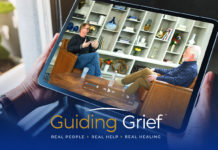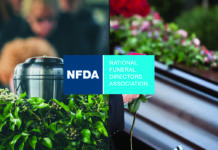Editor’s note: Navigating through these unprecedented times has been hard for everyone. Death seems to be everywhere we look these days, making it easy to feel overwhelmed. Many of us are experiencing anxiety about the possibility of losing a loved one. We hope this article will be a positive resource that you can share with the families you serve at your firm — and with your own families, as they worry about your safety serving on the front lines as the world combats this devastating virus.
By Leader Contributor Tracie Martin, Senior Marketing Writer at Legacy.com
Two weeks ago, I called my mom to tell her about my pandemic lockdown miracle. It was a doozy: I’d arrived at the grocery store just as a clerk was restocking the frozen vegetables! But before I could speak, Mom dropped her news. “I’m going back to work,” she said. I burst into tears.
My mom works in a hospital lab doing diagnostics. She tells me they’re helping set up the covid-19 antibody testing protocol there. It will help stop the spread of the disease. She will be helping people survive.
Everyone I tell about her work in the coming days will say: “Wow, she’s a hero.” But at that moment, on the phone, what I hear is that my 63-year-old mother, with health complications and two years away from retirement, will be around bags of coronavirus-filled blood all day. She will be walking through virus-infected parking lots, touching handles and faucets and vending-machine buttons that people exposed to the virus probably touched. She’s doing this in Detroit, a coronavirus hotspot.
It’s hard for me to see a world where she doesn’t get covid-19. And it’s almost impossible not to silently grieve her potential future death every day.
We all know that everyone dies. But for most of us, the timeline of our death, and those we love the most, is comfortingly vague. Until one day, it’s not. When the reality of someone’s death is fast-tracked into the immediate future — by, say, terminal diagnosis or a war-zone deployment — many of us start what experts call “anticipatory grief.”
When we grieve in advance…
According to renowned grief expert David Kessler, author of the bestselling Finding Meaning: The Sixth Stage of Grief, this experience — grieving the imminent loss of someone before they’re gone — stems from an adaptive source: our primal mind, searching unconsciously for threats and imagining future outcomes to prepare ourselves against any danger.
As we evolved, this trick helped keep us safe from predators, but things get complicated when our threat shifts to a particle in the air we can’t see. “There’s no lion anymore,” Kessler says. That unnerves our mind: “Wait, you might have the enemy on your hands? Everyone we love might have the enemy?”
To cope, we automatically turn those fears into forecasts, picturing our life if the worst should happen. For the families of front-liners, those imagined futures often end in a terrifying, all-too-close reality: the death of our loved one from constant exposure to covid-19.
There’s a degree to which that fear is practical. If someone we love could die, Kessler points out, “It’s going to make us wash our hands and take all this seriously.”
But when you can’t stop thinking about those fears, it can be incapacitating. My friend Paul is married to an ER nurse in a Chicago area hospital, and has been looking for coping strategies: “It’s too much to be on my brain constantly 24/7,” he says. “It’s just not manageable. I need to step away — but I can only step away from it for so long, because, well, she’s going back to work.”
So how do you cope when someone you love is in this kind of danger?
1. Focus on now.
If tomorrow is too terrifying to face, experts say, just don’t. “There is power in just being present right here, right now,” says Paul Denniston of GriefYoga.com. “One day at a time, one breath at a time, one moment at a time — just be here.”
So how do you do that? How do you bring yourself back from what Kessler calls “living in the wreckage of your future?” Grief therapist Claire Bidwell Smith, author of Anxiety: The Missing Stage of Grief, suggests simple activities that ground you in the current moment: “Taking a bath, petting an animal, going for a walk.”
2. Breathe.
One way to keep your thoughts under control is to focus on your breathing. “The body follows the mind, and the mind follows the breath,” Denniston says.
He recommends a breathing meditation called Bumblebee Breath, which pairs deep inhalations with a hum: “Just listen to the vibration as you exhale.” This not only pairs an auditory and physical sensation for focus, it also helps deepens the breath, relieving the constricted airflow that often comes with high anxiety.
3. Remember reality.
If negative thoughts persist, it can help to remember that the family of front-liners see the worst-case scenarios more often than others. The key, Kessler says, is finding a more balanced view: “You’ll find that, in life, the worst and the best [usually] don’t happen. Life becomes about the reality in the middle.” Right now, this means recognizing that not all frontline workers are getting covid-19. If they are, they’re still much more likely to recover from it than not.
Close family and friends can often provide a reality check. “Sometimes, our thoughts get so big in our head that even just talking out loud to someone can be helpful,” Bidwell Smith says. “Someone you can ask, ‘Should I be worrying about this as much as I am?’”
4. Recognize the good.
Seeking out positive information is a good way to counteract our natural skew towards negative news. For instance: It’s easy to get obsessed with following the daily numbers of new covid-19 cases. But it’s important to remember that most of those patients don’t die, they recover.
“Every time a covid-19 patient gets discharged,” my mom tells me, “they play Kool and the Gang’s Celebration throughout the whole hospital. Two weeks ago, we heard that like once a day. Now it’s once an hour.”
5. Seek support.
A heightened state of worry is our new normal, but there is definitely a point where anxiety needs professional attention. “If I can’t sit with you and have a meal without thinking of your death, I’m in trouble,” Kessler says. Harvard Medical School notes some physical cues to look out for that often accompany this level of anxiety, such as muscle pain, fatigue, headaches, nausea, breathlessness, and insomnia. Mental Health America offers an online anxiety assessment tool.
Luckily, there is no shortage of ways to get help. Bidwell Smith points to excellent telemedicine services that are available, as well as some useful meditation apps. Mental Health America offers a list of easy-to-access ways to connect with others during the crisis, including this online coronavirus support group.
Usually, some combination of all these coping tips work. I’ll take a bike ride and find myself singing. A deep breath yanks the reins on my thoughts for a while. My friend Paul tells me he’s bought himself a 3,000-piece Lego set. Thinking about the kids helps: Like parents everywhere, I don’t want my anxieties to hurt them. “When you’re taking it to a place where you’re having panic attacks, sleeplessness, emotional breakdowns,” Bidwell Smith says, “you need to start checking in and taking measures in order not to stay in that loop.”
Still, until this crisis is over, there is no place to return but home. And my mother is everywhere in my house, even from three hundred miles away. I can disappear into my yard and forget that she’s in danger, until I see the rosebush she gave me when we moved in. Stress-baking only works until I reach into a drawer and grab the red Tupperware teaspoon she gave me when I went away to college, the one that’s survived every move and spin through the disposal for twenty years.
It’s only when you brush against the raw truth of someone’s mortality that you see the ragged hole their loss would leave behind.
At a moment like that, it’s important to remember who you are. And who they are. I will not give in to my impulse to drive to Michigan and beg my mother on my knees to stay home and stay safe. I will call my mother every day, and commiserate about how the cat keeps chasing the ducks out of the pool, and ask how work is going. And I will tell her I’m proud.
News, Guides, and Resources
Legacy is providing regular updates, resources, and advice around end-of-life topics impacted by COVID-19. Click the links below to access our full libraries of epidemic coverage:








